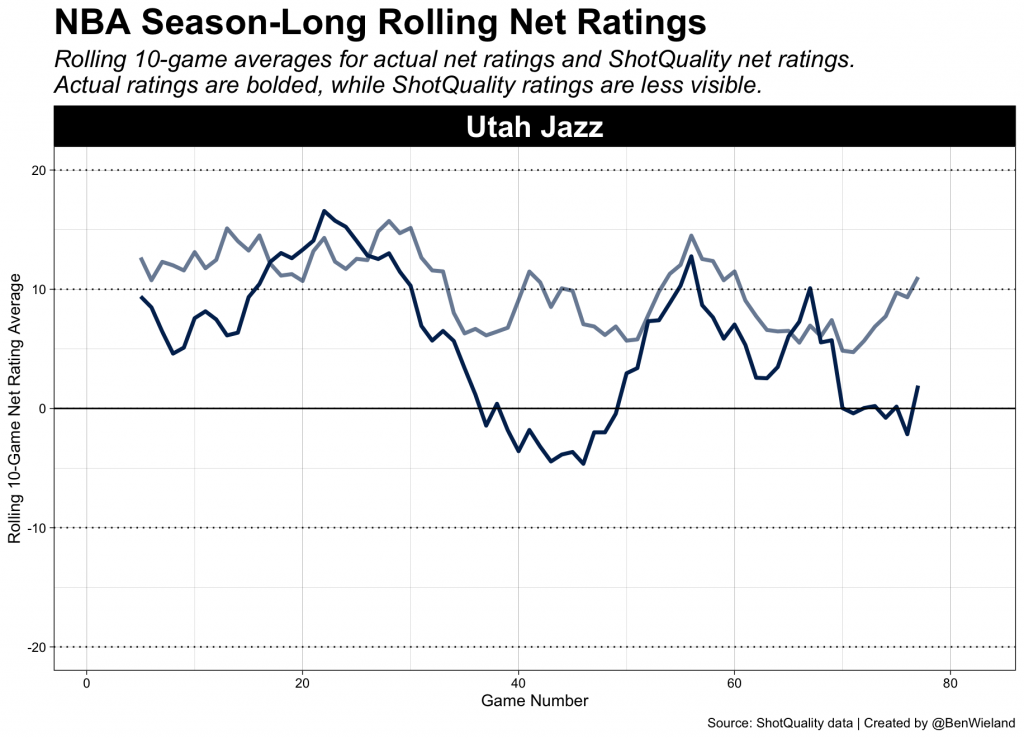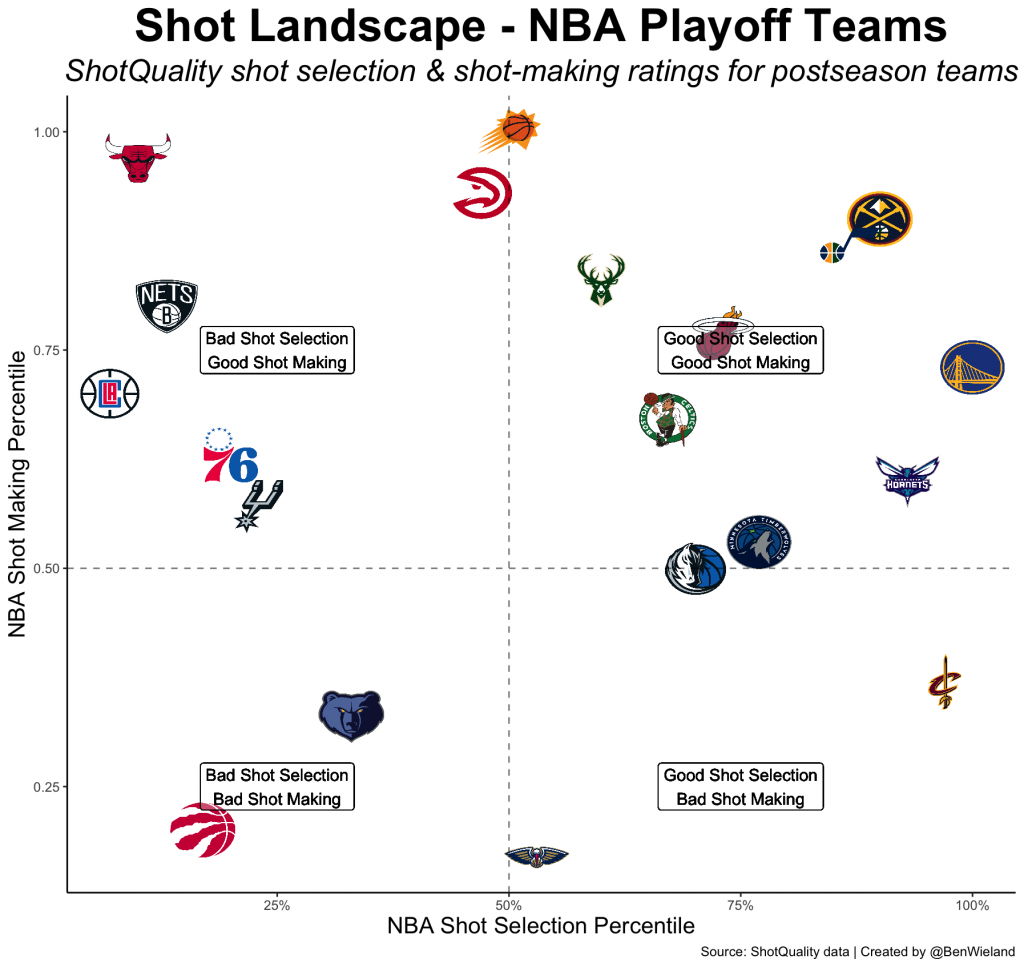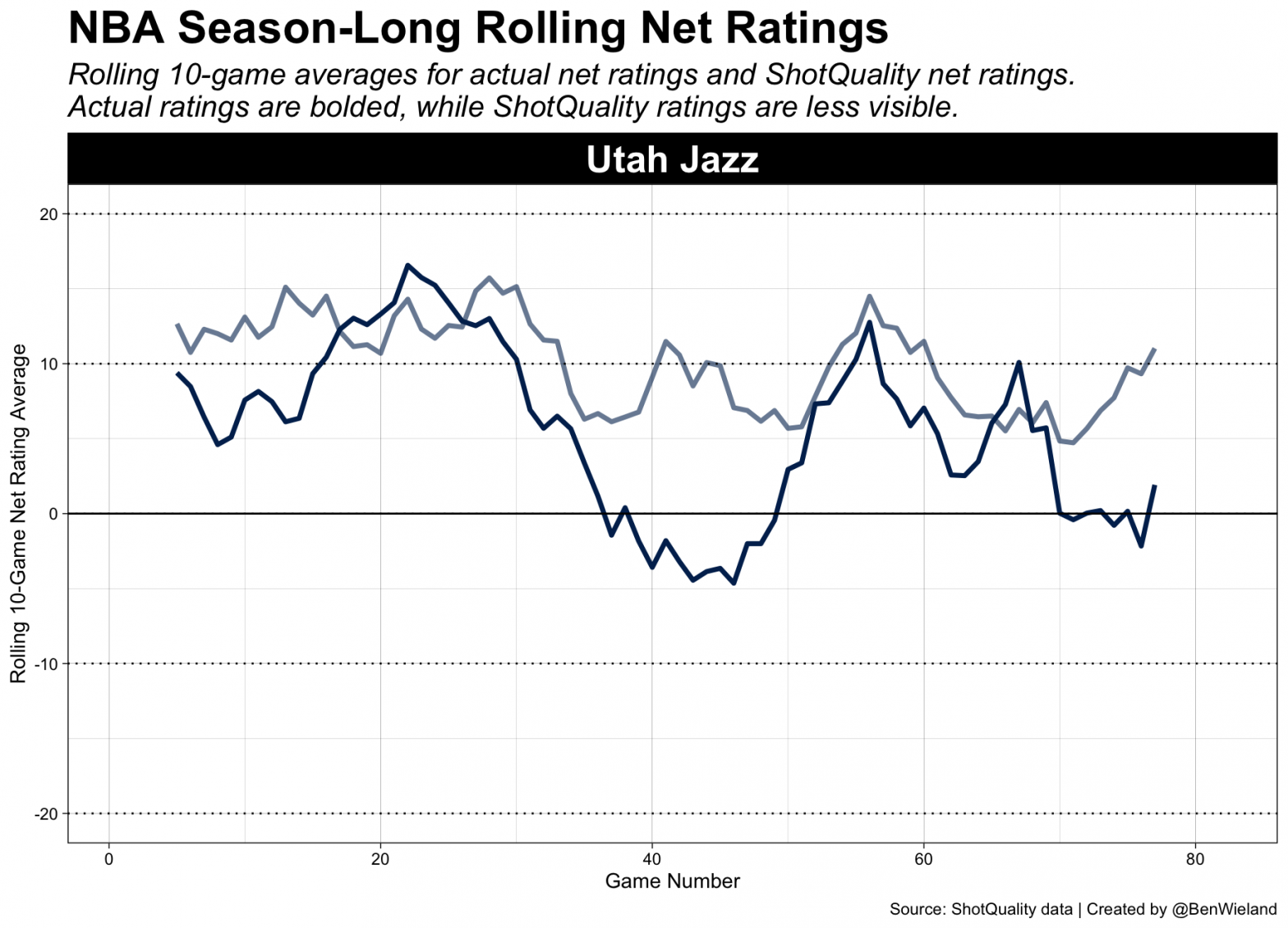By Ben Wieland
On December 3, 2021, the Utah Jazz rode Donovan Mitchell’s 34-point night and a scorching shooting performance — they made 27 of their 52 threes — to a thrilling 137-130 win over the Boston Celtics in Salt Lake City. ShotQuality’s game grades were skeptical. The model thought the Jazz had overperformed their expected score by 20 points, and if both teams had shot at their season averages, the Celtics would’ve eked out a lower-scoring 121-117 victory.
While it wasn’t clear at the time, as the season continued, this game would prove to be an outlier. Of the 82 games the Jazz played, that December thriller against the Celtics would prove to be the only game all year where they won a game that ShotQuality projected as a loss.
In fact, by ShotQuality’s record luck metric, no team in the NBA has been more unlucky than the Utah Jazz. They finished this year as the fifth seed in the Western Conference with a 49-33 record, a slightly underwhelming performance given last season’s 1-seed and 52-30 record but certainly nothing to scoff at. However, ShotQuality’s model expected the Jazz to win twelve more games than they actually did, finish 61-21, and have the best record in the NBA.
Since ShotQuality’s inception, the Jazz have been one of the metric’s favorite teams. They haven’t finished outside the top six in ShotQuality net rating in any of the past three seasons. This year, despite having just the ninth-best record in the NBA, the Jazz rank first overall in net rating, first overall in offensive rating, and fourth overall in defensive rating.
For almost the entire season, Utah’s actual net rating has lagged below their ShotQuality net rating. Even during Utah’s roughest stretches, like a midseason swoon that saw their actual net rating drop below zero, they continued to dominate the quality of shots taken.

The reason for Utah’s consistently high ShotQuality performances on offense is simple: they take smart shots, and have lots of efficient scorers.
In addition to their already-mentioned first place ranking in overall offensive shot quality, the Jazz also dominate a variety of sub-categories, most related to three-point shooting. The Jazz ranked second in the NBA in total three-pointers made this season, trailing just the Minnesota Timberwolves, while also finishing 11th in team three-point percentage at 36.0%.
However, ShotQuality viewed even this strong season as an underperformance. The Jazz ranked first in the “Spacing” metric, which tracks how much a team stretches the defense with their shooting ability (the Timberwolves were 13th). They finished the season fifth in shot selection and shot making, one of just two teams to rank in the top five for each metric for offensive performance; Nikola Jokic’s Nuggets were the other.

There’s no easy way to stop the Jazz from getting good shots on the offensive end, either. They actually rank last in the NBA in percentage of threes that are open. It just doesn’t matter, because they’ve done such a good job optimizing their personnel. They’re expected to shoot 39.7% on catch and shoot threes, fourth-best in the NBA, and 38.7% on off-dribble threes — a mark that ranks second in the league, which is even more impressive given that they take more threes off the dribble than any team in the NBA.
There are no weak spots to take advantage of offensively. The Jazz offense with Donovan Mitchell and Jordan Clarkson creating shots, Mike Conley facilitating, Rudy Gobert finishing, and everyone else knocking down their open looks is hyper-efficient; their top 10 players in minutes per game this year all ranked above the 50th percentile in expected points per possession. Donovan Mitchell ranks in the 80th percentile, while his pick-and-roll partner Rudy Gobert — who Mitchell has been accused of ignoring on offense this year — ranks in the 99th percentile of all scorers. He might not be able to create for himself, but Gobert is an excellent finisher.
Around them, there’s simply an undeniable litany of solid offensive players. The least efficient of the bunch is unsurprisingly Jordan Clarkson, but even he ranks above the 52nd percentile thanks to the coaching staff’s work to optimize his shot selection (Clarkson has taken just 15 long midrange jumpers this year). Even players who might struggle in other systems to take quality shots — Royce O’Neale, Danuel House, and Hassan Whiteside — all rank above the 85th percentile.
On defense, the singular impact of Rudy Gobert is well-documented by every advanced stat in existence. Gobert might lack versatility compared to other defensive anchors like Bam Adebayo, but there’s a reason he owns three Defensive Player of the Year trophies. Despite having a team of subpar defenders around Gobert and the big man missing significant time this season, the Jazz still finished with a top five defense in shot quality allowed this year.
They defend the two most valuable shots in the NBA — shots at the rim and threes — at an elite level. The Jazz rank in the top five defensively against all but one shot type: the midrange jumper, where they rank just 23rd in the NBA.
However, it remains to be seen whether Utah’s success in generating quality shots will actually translate to playoff victories. Their recent postseason underperformances, combined with reports of locker room tension this year, might make this season the last shot this Jazz core has to break through in the playoffs.
In recent years, their rigid defensive schemes have been their demise in the postseason as opponents have capitalized on Utah’s lack of quality perimeter defenders outside Royce O’Neale to generate tons of drive-and-kick threes and taken advantage of their pick-and-roll coverage to create open looks. At the same time, the Jazz’s hot shooting has a tendency to betray them in the playoffs when it’s most crucial to their success.
In spite of all that, Utah still has a chance to pull it together and put together a run to salvage this core. Recent trends on the court haven’t been great — the Jazz went just 10-10 over their final 20 games of the season, blew quite a few huge leads, and lost some marquee matchups against Phoenix and Golden State. They’ll have to take down the Mavericks as underdogs in the first round, a challenge that becomes slightly easier given Luka Doncic’s injury but remains a challenging task; even if they can pull that series out, the juggernaut Phoenix Suns loom in the conference semifinals. But if Utah experiences a reversal of fortune in the postseason and start seeing their dominance in shot quality translate to dominance in final scores, they could be a sleeper team to watch out for in the Western Conference.
